Chapter 7 - Selecting a Type of Business Ownership Power Point
advertisement
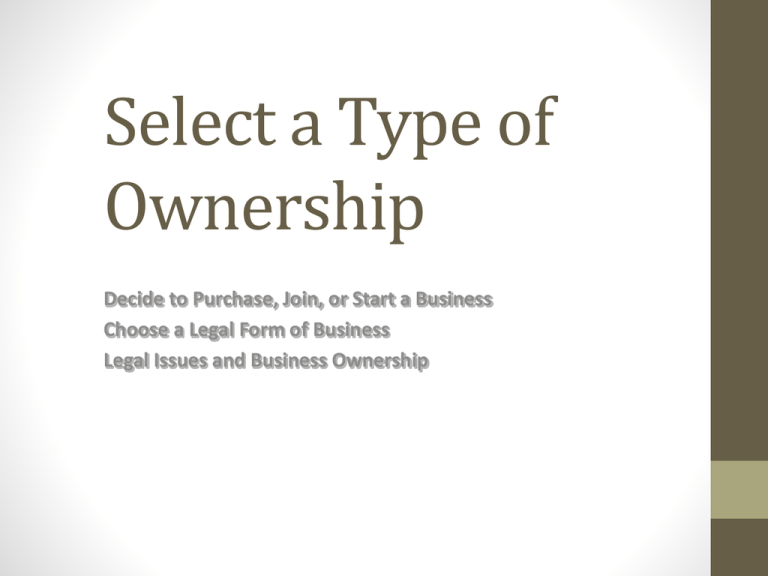
Select a Type of Ownership Decide to Purchase, Join, or Start a Business Choose a Legal Form of Business Legal Issues and Business Ownership What do you think? • Is it easier to: • Purchase an existing business that is for sale • Join a family business • Start a new business from scratch Buy an Existing Business or Start Your Own? • 3 things to consider: • How much experience do you have? • What kind of business do you want? • What kind of financial risks are you willing to take? Purchase an Existing Business • Owners sell businesses for a variety of reasons including: • • • • • • insufficient profits new competition fear of changing economic conditions retirement dispute among partners illness of a partner Purchase an Existing Business • There are many ways to find a business that is for sale including: • advertisements in the newspaper • consulting a business broker • networking Advantages of Buying an Existing Business • The equipment, suppliers, and procedures are in place. • Goodwill may already be established. • The seller may train the new owner. • Established financial records exist. • Financial arrangements may be easier. Disadvantages of Buying an Existing Business • The business may be for sale because it is not profitable. • Serious problems may be inherited. • Capital is required. Steps in Purchasing a Business • Write specific objectives about the kind of business you want to buy • Meet with sellers or brokers to investigate specific opportunities • Visit during business hours to observe the business in action. • Obtain accounting records for the prior three years. Steps in Purchasing a Business • Get important information in writing. • reviewed by a lawyer • reviewed by an accountant • Determine how you would finance the business. • Get expert help to determine the price to offer for the business. • Valuator – an expert on determining the value of a business Franchise Ownership • franchise • a legal agreement that gives an individual the right to market a company’s products or services in a particular area • franchisee • the person who purchases a franchise • franchisor • the company that offers the franchise for purchase Operating Costs of a Franchise • initial franchise fee • the amount the local franchise owner pays in return for the right to run the franchise • startup costs • the costs associated with beginning a business • royalty fees • weekly or monthly payments made by the local owner to the franchise company • advertising fees • paid to the franchise company to support television, magazine, or other advertising of the franchise as a whole Investigate the Franchise Opportunity • Franchise Disclosure Document (FDD) • a regulatory document describing a franchise opportunity that prospective franchisees must receive before they sign a contract • must be provided to franchisee at least 14 days before a contract is signed • Information contained in the FDD includes: • • • • • background and experience of the business’s key executives costs of starting and maintaining the business terms of the franchise agreement acceptable reasons for contract termination the responsibilities you and the seller will have once you have invested in the opportunity Evaluate a Franchise • Study the disclosure document and proposed contract carefully. • All costs and royalty fees should be provided. • Interview current owners. • Beware of “shills” - business references who are paid to give favorable reports • Investigate the franchisor’s history and profitability. • Investigate claims about your potential earnings. • Does projected local demand match potential earnings? • Have the seller provide, in writing, the number and percentage of owners who have done as well as they claim you will. Evaluate a Franchise • Listen carefully to sales presentations. • Do not sign up immediately. • Do not fall for a promise of easy money. • Shop around. • Compare to other business opportunities. • Get the seller’s promises in writing. • Determine what will happen if you want to cancel the franchise agreement. • Remember that it is okay to ask for advice from professionals. Advantages of Owning a Franchise • An entrepreneur is provided with an established product or service. • Franchisors offer management, technical, and other assistance. • Equipment and supplies can be less expensive. • A guarantee of consistency attracts customers. Disadvantages of Owning a Franchise • Franchise fees can be costly and cut down on profits. • Owners of franchises have less freedom to make decisions than other entrepreneurs. • Franchisees are dependent on the performance of other franchises in the chain. • The franchisor can terminate the franchise agreement. Enter a Family Business • The U.S. economy is dominated by family businesses. • Some estimates indicate 90 percent of businesses are family owned. • 35% of Fortune 500 companies are family controlled • 50% of US GDP comes from family businesses • 60% of US employment • Many large companies are still owned by relatives of the company founder. • Wal*mart • Ford Motor Company Advantages of a Family Business • Benefits of working at a family business include: • pride and a sense of mission • a feeling of continuity from keeping the business in the family for another generation • enjoyment derived from working with relatives Disadvantages of a Family Business • Challenges of working in a family business include: • Family members, regardless of their ability, often hold senior management positions • poor business decisions can be made • it is difficult to retain non-family employees • • • • Family politics often enter into business decision making. Business and private life often affect each other. Independent decision making is difficult. It can be challenging to determine what to do with the business when there is not a family member available to run it. Starting Your Own Business • If purchasing a franchise or joining a family business will not work for you, consider starting your own business. Advantages of Starting Your Own Business • Independent business owners enjoy: • • • • complete autonomy over all business decisions the ability to create their own destiny the challenge of creating something brand new feeling triumphant when the business turns a profit Disadvantages of Starting Your Own Business • Risks to consider when starting your own business include: • product demand is uncertain • you must make decisions that other types of entrepreneurs do not need to make Lesson 7.2 Choosing a Legal Form of Business • Sole Proprietorship • Partnership • Corporation Number of Businesses in US by Type 6% 19% Sole Proprietorship Corporations Partnerships 75% Sales Revenue in US by Business Type 8% 5% Sole Proprietorships Corporations Partnerships 87% Sole Proprietorship • Sole Proprietorship • A business that is owned exclusively by one person • Easiest and least expensive way to start a business • No documents or forms needed UNLESS you operate under a name that is not your own Sole Proprietorship • How to Set Up: • No legal steps required • Except professional certifications • Choose a name • Workman’s Puppies vs. Pampered Puppies • If you’re reasonably well-known and well-respected, using your own name is a great marketing tool • HOWEVER, if your business fails or you get into financial or legal trouble, it’ll have your name on it and people may associate your name with the earlier troubles • Protect your name • Pick a domain name for your website • Register your name • DBA – Doing Business As • Trademark your name • US Patent and Trademark Office Sole Proprietorship • How to Set Up (continued): • Keep Finances Separate from your Personal Activities • Business Bank Account • Business Credit Card • Business Record Keeping • Why is this important? • Be Prepared for Paying Taxes • If no employees, can operate under your SSN • If employees, need a federal Employer Identification Number (EIN) • If profitable, you will owe self-employment taxes • Get Insurance • • • • Property and liability Auto Health Disability Advantages of a Sole Proprietorship • Most common form of US business ownership • Over 17 million in operation • Easy to set up; minimal government regulation • Low cost method of entering the business world • Complete control over all decisions Disadvantages of a Sole Proprietorship • It can be difficult to raise money for the business • You bear the burden of all the risks • If the business fails, your personal assets can be jeopardized Partnership • Partnership • A business owned by two or more people • Share in the decision-making and management responsibilities • Share in the risks and rewards Partnership • Things to consider: • Do you really need a partner to make business successful? • Do they have financial resources or vital skills you lack? • Can you hire them instead of partner with them? • Do you really know the other person? • Do you have similar values, communication styles, ethics, etc. • Test the partnership out by tackling a small project together first • Outline in advance critical elements such as: • Compensation • Exit Clauses • Roles and Responsibilities Partnership Agreement • Outlines the rights and responsibilities of each of the owners including • • • • • • • • • • • • Business name Names of partners Investment by each partner Delegation of management duties Accounting methods used Rights to audit accounting documents Profit and loss distribution Salaries Length of partnership Conditions under which the partnership can be dissolved Asset distribution upon dissolution of partnership Procedure for dealing with the death of a partner Advantages of a Partnership • Multiple sources of capital • Risks are spread among partners • Minimal government regulation Disadvantages of a Partnership • Responsibilities and profits are shared • Can be held liable for errors of partners What Went Wrong? Stan and Pete met while working at a video production company. Stan was in charge of editorial and production. Pete ran the sales force. Stan decided to begin his own company and invited Pete to join him. SP Communications seemed like a perfect partnership. Pete would handle sales and administration while Stan managed clients and directed production. Things seemed to be going well until Pete decided he wanted to be a part of the creative process. He spent most of his time producing videos rather than looking for new business. Because of their friendship, Stan trusted that Pete was taking care of his side of the business. As it turned out, Pete wasn’t very good at the creative tasks he attempted. He made mistakes that reduced expected profits. In addition, he wasn’t making new sales contacts, which was supposed to be his main job. By the time Stan realized what was happening to the business, it was too late. There weren’t any new sales. What Stan thought were profits were the result of Pete not paying their bills. Stan was left with more than $150,000 in unpaid bills and other debts. Pete left the business. It took Stan 3 years to dig out of the financial mess and get his new company up and running successfully. Questions: 1. How might Stan and Pete have avoided the problems that led to the end of their partnership? 2. Why is this situation a good example of the difficulty in maintaining partnerships between friends? 3. What types of things should be spelled out completely between partners at the beginning of the partnership? Corporation • Corporation • • • • Most common form of business organization Must be chartered by a state Has many legal rights as an entity separate from its owners Ownership determined by how many shares of stock you have • Board of Directors – elected group of individuals who make important decisions about company • Company Officers – responsible for the day-to-day management of the business • The corporation, not the owners, transacts business How to Form a Corporation • Choose an available business name that complies with your state’s corporation rules • Appoint the initial Directors of your corporation • File formal paperwork, or Articles of Incorporation, and pay filing fee • Create corporate “bylaws”, which lay out the operating rules for your corporation • Hold the first meeting of the Board of Directors • Issue Stock Certificates to the initial owners (shareholders) • Obtain licenses and permits that may be required for your business Disadvantages of a Corporation • A lawyer is required to establish a corporation because a corporation is complex • Costly • Articles of incorporation must be filed • Corporations are subject to more government regulation than other types of businesses • Income is taxed twice • Corporate income • Individual income Advantages of a Corporation • Personal liability is limited to the amount of money each shareholder invested in the company • Personal assets of shareholders are protected • Corporations can raise money by selling stock • Reputation and backing of recognized name S Corporation • A corporation organized under Subchapter S of the Internal Revenue Code • Used for smaller businesses • Many new businesses lose money in the first years • S Corporation not taxed as a business • Pay taxes if make a profit, but if the business looses money, owners can use the losses to offset other sources of personal income • tax break Limited Liability Company • Limited Liability Company (LLC) • Provides the benefits of partnership taxation and limited personal liability • Not subjected to the rules of an S corporation • Members can participate in business management • LLCs have restrictions • Limited by state law • Single owner cannot establish an LLC • Some states limit the life of an LLC Lesson 7.3 Legal Issues and Business Ownership Lesson 7.3 Legal Issues and Business Ownership Goals • Recognize how laws promote competition • Describe how entrepreneurs protect intellectual property • Identify regulations that protect the public and how they affect businesses • Describe when and how a business owner should seek legal advice Regulations That Promote Competition • The government has enacted various laws to help protect businesses. • Antitrust Legislation • Consumer Protection • Financial Accuracy Antitrust Legislation • Antitrust laws ban business activities that do not promote competition. • • • • Sherman Act Clayton Act Robinson-Patman Act Wheeler-Lea Act Antitrust Legislation • Sherman Act • Competitors can not get together to set prices at a certain level. • Discussing pricing with competitors is illegal. • Clayton Act • It is illegal for a business to: • require a customer to buy exclusively from it • force a customer to purchase one good in order to be able to purchase another good Antitrust Legislation • Robinson-Patman Act • It is illegal to discriminate by charging different prices to different customers. • Some economically sound reasons that allow for different prices include: • volume discounts • special distribution • legal requirements that vary by location • Wheeler-Lea Act • Unfair or deceptive actions or practices by businesses that may cause an unfair competitive advantage are banned. • false advertising • Businesses are required to warn consumers about possible negative features of their product. • potential side effects of medication Is this false advertising? False Advertising • Models Consumer Protection Legislation • Laws and organizations designed to ensure the rights of consumers as well as fair trade competition and the free flow of truthful information • These laws protect the public from harmful products • FERPA • HIPPA • Other Laws that Protect Consumers FERPA • Federal Educational Rights and Privacy Act • • • • • Established in 1974 Gives students access to their education records The opportunity to seek to have the records amended Control over the disclosure of information from the records Only applies to educational institutions that receive funding from the U.S. Department of Education • Why would this apply to business? HIPAA • Health Insurance Portability and Accountability Act • Established in 1996 • Privacy of individuals health information • Includes information on: • Medical records • Medical billing • Clinical or research databases • Why would this apply to business? Other Laws that Protect Consumers • Licenses • State and local governments require some businesses to have licenses. • training may be required • inspections may be required • Zoning Laws • Local governments often establish zoning regulations that control what types of buildings can be built in specific areas. Other Laws that Protect Consumers • The Federal Food, Drug, and Cosmetic Act of 1938 • Covering food, drugs, and cosmetics, this law bans selling products that are: • • • • impure improperly labeled falsely guaranteed Unhealthful • The Consumer Product Safety Act of 1972 • sets safety standards for products other than food and drugs • The Truth-In-Lending Act of 1968 • requires all banks to calculate credit costs in the same way Laws Concerning Financial Accuracy • Sarbanes-Oxely Act • Introduced in 2002 as a direct result of Enron scandal • Improved the accuracy and reliability of corporate disclosures made pursuant to the securities laws • Created new standards for corporate accountability as well as new penalties for acts of wrongdoing Government Agencies that Protect Competition • Justice Department • The Antitrust Division takes legal action against any business it believes has tried to monopolize an industry • Prosecutes businesses that violate antitrust laws • Federal Trade Commission • The FTC administers most of the laws dealing with fair competition • • • • false advertising price setting by competitors price discrimination product misrepresentation How to Protect Business • Intellectual Property • The original creative work of an artist or inventor • songs, novels, artistic designs, inventions • No one can use someone else’s original work to make money. • Patent • The grant of a property right to an inventor to exclude others from making, using, or selling his or her invention • Lasts for 20 years • Provisional patent application • Allows inventor one year to research details of an idea prior to filing a patent How to Protect Business • Copyright • an intellectual property law • protects works of authorship • remains in effect for 70 years after the death of an author • Trademark • name, symbol, or special mark used to identify a business or brand of product Legal Issues Affecting Business • Learning some basics about the laws affecting businesses will help you handle minor legal issues independently. • Sometimes you will need to hire a lawyer. Contracts • Contract - a legally binding agreement between two or more persons or parties • Offer and Acceptance • one party offers or agrees to something and the other party accepts • Consideration • what is exchanged for the promise • Capacity • the parties are legally able to enter into a binding agreement • Legality • a contract cannot have anything in it that is illegal or that would result in illegal activities • Genuine Assent • the agreement is not based on deceit, mistakes, or unfair pressure Torts Relating to Business Enterprises • Tort • a wrong against people or organizations for which the law grants a remedy • liability can be established through • • • • duty breach injury causation Hire a Lawyer • At some point, you will probably need to hire a lawyer to assist you with legal issues affecting your business.


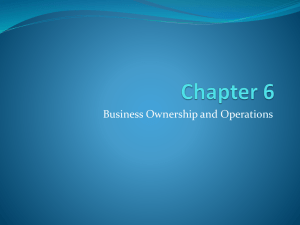
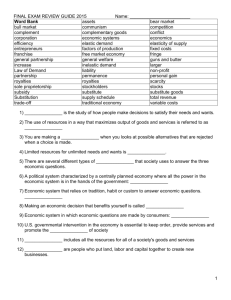
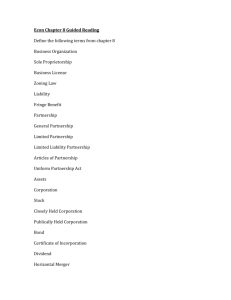
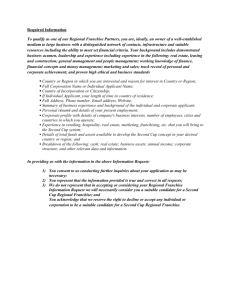

![SBE03[1].01](http://s2.studylib.net/store/data/009907829_1-78ccdc09e75adf2351c2ff6cd9f4e040-300x300.png)